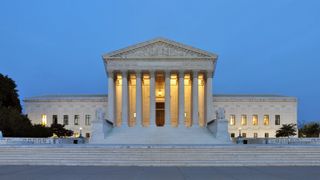Odds Favor Bettor Ad Gains for Networks
Media networks, starved for new sources of advertising revenue, may find a wellspring of opportunity in the form of sports gambling ads, according to Morgan Stanley media analyst Ben Swinburne.
TV networks such as ESPN, Fox, CBS and NBC are expected to be the biggest beneficiaries, Swinburne wrote in a recent deep dive into sports betting. Fox, especially after it sells certain assets to either The Walt Disney Co. or Comcast and concentrates on live sports and news, could see healthy ad revenue gains, as could CBS, he added.
According to Swinburne’s estimates, the post-deal “New” Fox might generate a 2.1% lift in ad revenue accountable to sports betting this year, with CBS experiencing a 1.5% gain. In a more bullish scenario — where overall sports betting revenue rises more aggressively — Fox’s increase grows to 4.1%, with CBS adding 3.1%.
Swinburne conservatively estimated that legal U.S. sports betting revenue will reach $5 billion by 2025 — or $10 billion in a “bull” case scenario. About 20% of that haul will be devoted to TV advertising spent to lure gamblers.
Seeing the Light on Gambling Ads

Sports betting in the United States has resided mainly in the shadows, but it moved into the light earlier this year when the Supreme Court invalidated the Professional and Amateur Sports Protection Act. PASPA prevented states from allowing legal sports betting outside of horse racing and lotteries, but now each state has the right to pass its own laws legitimizing the practice.
Some leagues, such as the National Football League, have frowned upon legalizing betting for their respective sports, but some states such as New Jersey have already given the green light. Others are sure to follow: Swinburne estimated that 31 states will legalize sports betting by 2023.
Multichannel Newsletter
The smarter way to stay on top of the multichannel video marketplace. Sign up below.
Swinburne’s base case estimates predict that paid media will attract about $1 billion in sports betting advertising in 2025 — his bull case puts that figure at about $1.5 billion. Of those totals, TV sports betting advertising is expected to account for about 75%.
Related: Sports Sites Encouraged By Betting Ruling
Other analysts were less optimistic. Pivotal Research Group advertising analyst Brian Wieser said new ad categories are likely to emerge in the wake of the Supreme Court ruling, but he was uncertain of the overall impact.
“It is hard to tell if growth from those categories offsets softness from more mature brands who are either looking to reduce spending broadly or are shifting away from paid media for their marketing activities,” Wieser wrote in a note to clients.
There is ample evidence that TV will be a big beneficiary of sports gambling. In 2015, fantasy sports companies FanDuel and DraftKings spent huge amounts of money to advertise their services, which some considered to be loosely disguised gambling. Both companies pulled their campaigns after several state attorneys general threatened to bring action against them.
Almost immediately after the Supreme Court ruling, DraftKings said it would offer sports betting, and with such legalized gambling expected to become the rule in most states, others are expected to follow suit, and turn to advertising to differentiate themselves.
According to Kantar, FanDuel and DraftKings spent a combined $400 million on ads in 2015, with about 80% of that figure devoted to TV spots. For the second half of that year, FanDuel and DraftKings represented 2% of total domestic TV ad revenue for the networks that carried sports — ESPN, TBS/TNT, ABC, CBS, NBC and Fox — and was largely responsible for the acceleration in TV ad revenue for that year.
Direct sports betting advertising won’t be the only windfall for networks — it could also bring a ratings lift.
Swinburne cited Nielsen data that found adults who bet on the NFL watched 19 more games in the 2015 regular season than adults who didn’t bet at all. And casinos and online betting sites could partner with media companies to improve their competitive positioning. Swinburne pointed to Sky Betting & Gaming, a British online gaming company that improved it share of the U.K. market from 6% to 12% after partnering with Sky TV.
Separately, National Research Group said earlier this year that 79% of current and potential gamblers said they would watch more live TV sports, with 63% saying they would watch a greater variety of sports and 60% saying they would watch sports they didn’t watch before.
